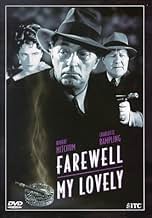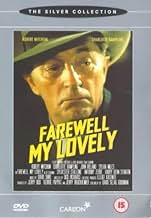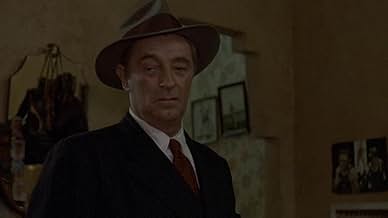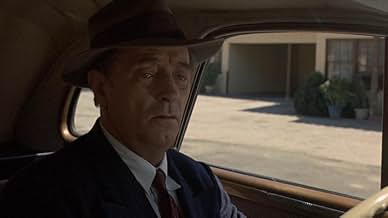VALUTAZIONE IMDb
7,0/10
10.426
LA TUA VALUTAZIONE
L'investigatore privato di Los Angeles Philip Marlowe viene assunto dal detenuto in libertà vigilata Moose Malloy per trovare la sua ragazza Velma, ex ballerina di uno squallido locale nottu... Leggi tuttoL'investigatore privato di Los Angeles Philip Marlowe viene assunto dal detenuto in libertà vigilata Moose Malloy per trovare la sua ragazza Velma, ex ballerina di uno squallido locale notturno.L'investigatore privato di Los Angeles Philip Marlowe viene assunto dal detenuto in libertà vigilata Moose Malloy per trovare la sua ragazza Velma, ex ballerina di uno squallido locale notturno.
- Regia
- Sceneggiatura
- Star
- Candidato a 1 Oscar
- 1 vittoria e 3 candidature totali
Jimmy Archer
- Georgie
- (as Jimmie Archer)
Recensioni in evidenza
Farewell, My Lovely (1975)
A Truly Gorgeous, Vivid, Stylish Color Noir...Don't Prejudge it on 1940s Noir Terms!
This is a gorgeous surprise, a retreat forward, a 1940s drama not done in painful nostalgic pastel hues and soft edges, but in bold bright 1975 color and pitch dark shadow. You have to say the obvious and get it over with: yes, this is a modern "film noir." But it isn't a mere homage, nor a remake, nor a cheap imitation. Director Dick Richards, who has no other well known film to his credit, pulls a gem out of nowhere on this one. Just be sure to watch it for what it is, a dramatic period crime film, not for what you think it ought to be, a slavish remake of a classic noir. And he has the help of the perfect cinematographer for the subject, John A. Alonzo, who did both Chinatown (the year before) and eight years later, Scarface, both post-noir landmark crime films.
Of course, this version of Farewell, My Lovely is, strictly speaking, a remake, which is to say, it's the third movie based on Raymond Chandler's 1940 novel of the same name. And inevitably we are going to compare to the other great version, Dmytryk's 1944 true, early film noir (called Murder, My Sweet). I say other great version, because both are really fine films, and different enough to avoid copycatting. Farewell, My Lovely is actually the more original of the two, an irony after 31 years of influences. And in some ways it's better, mainly because it has Robert Mitchum very much in top form. He makes those beautifully concise and witty one liners seem real and fitting, as if people really did once talk like that. I wish they still did.
There are countless bit parts that pump up the stylishness of the movie, most memorably Sylvia Miles playing a hard-drinking has-been. And she and Mitchum have great chemistry, not as lovers, but as people from opposite sides of life who have a similar perspective on things, and they chat and resonate like old friends. (Compare this to the rougher, less involving scene in Murder, My Sweet.) Velma herself is none other than Charlotte Rampling, probably a hair miscast because Rampling has some kind of severity that the noirish femme fatales don't, as a stereotype, share. And this movie deals with stereotypes.
Mitchum above all. It's fascinating to see a movie that is meant to be fitting into a form well known enough to be able to both refer to (in style and plot) and to deviate from (so we can feel it's original intent). And to have Mitchum, with his decades of great, strong, roles, anchor it all makes for a sweet, almost poignant experience. A similar feeling might be had in the remake of Cape Fear, but for my money, this is the more interesting movie, whatever the limitations of the plot, and the big thug. Go ahead, compare the Dmytryk version to this Richards one. If you haven't seen either one, watch the more recent one first to give it a full chance. You might go away surprised.
A Truly Gorgeous, Vivid, Stylish Color Noir...Don't Prejudge it on 1940s Noir Terms!
This is a gorgeous surprise, a retreat forward, a 1940s drama not done in painful nostalgic pastel hues and soft edges, but in bold bright 1975 color and pitch dark shadow. You have to say the obvious and get it over with: yes, this is a modern "film noir." But it isn't a mere homage, nor a remake, nor a cheap imitation. Director Dick Richards, who has no other well known film to his credit, pulls a gem out of nowhere on this one. Just be sure to watch it for what it is, a dramatic period crime film, not for what you think it ought to be, a slavish remake of a classic noir. And he has the help of the perfect cinematographer for the subject, John A. Alonzo, who did both Chinatown (the year before) and eight years later, Scarface, both post-noir landmark crime films.
Of course, this version of Farewell, My Lovely is, strictly speaking, a remake, which is to say, it's the third movie based on Raymond Chandler's 1940 novel of the same name. And inevitably we are going to compare to the other great version, Dmytryk's 1944 true, early film noir (called Murder, My Sweet). I say other great version, because both are really fine films, and different enough to avoid copycatting. Farewell, My Lovely is actually the more original of the two, an irony after 31 years of influences. And in some ways it's better, mainly because it has Robert Mitchum very much in top form. He makes those beautifully concise and witty one liners seem real and fitting, as if people really did once talk like that. I wish they still did.
There are countless bit parts that pump up the stylishness of the movie, most memorably Sylvia Miles playing a hard-drinking has-been. And she and Mitchum have great chemistry, not as lovers, but as people from opposite sides of life who have a similar perspective on things, and they chat and resonate like old friends. (Compare this to the rougher, less involving scene in Murder, My Sweet.) Velma herself is none other than Charlotte Rampling, probably a hair miscast because Rampling has some kind of severity that the noirish femme fatales don't, as a stereotype, share. And this movie deals with stereotypes.
Mitchum above all. It's fascinating to see a movie that is meant to be fitting into a form well known enough to be able to both refer to (in style and plot) and to deviate from (so we can feel it's original intent). And to have Mitchum, with his decades of great, strong, roles, anchor it all makes for a sweet, almost poignant experience. A similar feeling might be had in the remake of Cape Fear, but for my money, this is the more interesting movie, whatever the limitations of the plot, and the big thug. Go ahead, compare the Dmytryk version to this Richards one. If you haven't seen either one, watch the more recent one first to give it a full chance. You might go away surprised.
Stylish remake of the much-filmed Chandler classic. Was Mitchum too old for the rolethat was the rap at the time. In hindsight, I don't think so, especially when he has that persuasive moment about aging near film's end. He certainly looks like he's climbed too many stairs and closed too many bars, but then that creates an unusual amount of pathos that deepens the role. Still and all, the passionate clinches with a sleek young Charlotte Rampling are borderline at best.
This is one of the few successful neo-noirs in my little book. Director Dick Richards and crew manage a funky look just right for the hard-boiled atmosphere of 40's detective fiction. Marlowe (Mitchum) drifts from one seedy venue to the next in his search for the mysterious Velma. But true to Chandler's slice-of-life LA, there's also a glimpse of the high- and-mighty in a Beverly Hills palace worthy of royalty. In fact, Marlowe resembles something of a pilgrim loner navigating greater LA in search of an elusive truth even after he's forgotten why.
Mitchum, of course, lowkeys all the way, hardly changing expression whether being roughed up by Moose Malloy or nuzzling up to Helen Grayle (Rampling). It has to be one of the more downbeat performances in private eye annals. But my Oscar goes to Sylvia Miles as the ultimate blowzy drunk (Florian). Her house is a mess, her hair is a mess, and her robe never quite fits in revealing ways Marlowe refuses to pick up on. Still and all, a fling with her looks more promising than an interlude with that plastic mannequin Marlowe does cozy up with. At the same time, Jack O'Halloran as the Moose comes across as the kind of pitiable dumb ox who would sacrifice everything for a faithless woman. In fact, the movie boils down oddly to something of a Samson and Delilah update.
But not everything is upside. The dialogue occasionally gets a little too cute, while the DiMaggio running thread seems forced at times. Nonetheless, it's a worthy version of the popular novel, and I'm just sorry that director Dick Richards hasn't been more active in the production end of the business. Judging from this film and the under-rated Culpepper Cattle Company, he certainly has the talent. And when an expressionless Marlowe comes to part with his money at movie's end, we finally glimpse that remote inner terrain and the heart of Chandler's heartless world.
This is one of the few successful neo-noirs in my little book. Director Dick Richards and crew manage a funky look just right for the hard-boiled atmosphere of 40's detective fiction. Marlowe (Mitchum) drifts from one seedy venue to the next in his search for the mysterious Velma. But true to Chandler's slice-of-life LA, there's also a glimpse of the high- and-mighty in a Beverly Hills palace worthy of royalty. In fact, Marlowe resembles something of a pilgrim loner navigating greater LA in search of an elusive truth even after he's forgotten why.
Mitchum, of course, lowkeys all the way, hardly changing expression whether being roughed up by Moose Malloy or nuzzling up to Helen Grayle (Rampling). It has to be one of the more downbeat performances in private eye annals. But my Oscar goes to Sylvia Miles as the ultimate blowzy drunk (Florian). Her house is a mess, her hair is a mess, and her robe never quite fits in revealing ways Marlowe refuses to pick up on. Still and all, a fling with her looks more promising than an interlude with that plastic mannequin Marlowe does cozy up with. At the same time, Jack O'Halloran as the Moose comes across as the kind of pitiable dumb ox who would sacrifice everything for a faithless woman. In fact, the movie boils down oddly to something of a Samson and Delilah update.
But not everything is upside. The dialogue occasionally gets a little too cute, while the DiMaggio running thread seems forced at times. Nonetheless, it's a worthy version of the popular novel, and I'm just sorry that director Dick Richards hasn't been more active in the production end of the business. Judging from this film and the under-rated Culpepper Cattle Company, he certainly has the talent. And when an expressionless Marlowe comes to part with his money at movie's end, we finally glimpse that remote inner terrain and the heart of Chandler's heartless world.
L.A. of June 1941 as it was depicted in the Raymond Chandler's novel of the same title is filled with the dark secrets of the past that better stay uncovered. Philip Marlow, PE (Robert Mitcum) takes a job to find a vanished girlfriend of the felon Moose Malloy, and he has no idea what will follow. As Marlow searches for Velma Galento, he has to deal with a beautiful but cold and calculating seductress (Charlotte Rampling - young, sensual and dangerous), a jealous corrupt detective (Stanton), an old alcoholic girlfriend (Sylvia Miles in one of her two Oscar nominated performances, second - the shortest in the history of Oscars, for "Midnight Cowboy"), and a buffed thug (Sylvester Stallone -- it was fun to see him before he became a star of Rocky and Rambo).
This adaptation of Raymond Chandler novel features action, suspense, humor, mystery and Robert Mitchum in one of his best performances as a man struggling with cynicism, hatred, and betrayal.
This adaptation of Raymond Chandler novel features action, suspense, humor, mystery and Robert Mitchum in one of his best performances as a man struggling with cynicism, hatred, and betrayal.
This re-make of Raymond Chandler's work has the edge on the 1944 film. Robert Mitchum's face fits the film perfectly. His ageing hard boiled-looking features look like a relief map of the Rocky Mountains! In this movie Mitchum was as good he has ever been. He got better as he got older. What I also liked was the haunting but soulful musical score, at the beginning and at the end.
In the closing scene an atmosphere of rising crisis that seems to hang in the air; created by the soulful musical score. Marlow with the case all wrapped up and himself at a loose end; in the amusement centre playing the machines, picks up a discarded newspaper with "Tokyo" in bold print as the front page headline. Was this the late hours of the 6th of December in Los Angeles? A sailor and his girl, and a soldier in the background makes it seem so. Both the sailor and the soldier, and the whole of America blissfully unaware, that a Japanese armada has shaped a easterly course
across the North Pacific. That scene coupled with the soulful musical score is like a forlorn-sounding and doom-laden overture to what is about to happen with surprising and devastating suddenness on the following but quiet Sunday morning in Hawaii. It is not surprising that one of the songs is titled, "Sunday".
In the closing scene an atmosphere of rising crisis that seems to hang in the air; created by the soulful musical score. Marlow with the case all wrapped up and himself at a loose end; in the amusement centre playing the machines, picks up a discarded newspaper with "Tokyo" in bold print as the front page headline. Was this the late hours of the 6th of December in Los Angeles? A sailor and his girl, and a soldier in the background makes it seem so. Both the sailor and the soldier, and the whole of America blissfully unaware, that a Japanese armada has shaped a easterly course
across the North Pacific. That scene coupled with the soulful musical score is like a forlorn-sounding and doom-laden overture to what is about to happen with surprising and devastating suddenness on the following but quiet Sunday morning in Hawaii. It is not surprising that one of the songs is titled, "Sunday".
The choice of Mitchum for the lead role really did work. The novel suggest a tired Marlowe, who has had enough of being "detective to the stars". He wants to get out of his seedy little life, and change things, but instead, he gets wrapped up in another case. Mitchum's hang dog expression and tired wise guy act sums up the depression of the fallen hero. This is not the smooth talking Bogart, not the finely clipped and smooth Powell, but a harder, more experienced Marlowe, a man more aware of his own downfall. As he says to knulty, what he need is a nights sleep, what he needs is another drink. After watching this truly excellent recreation of late forties LA, I'm not sure that I couldn't agree with him.
Ah yes, and Charlotte Rampling and the sometime Thelma really was "cuter than lace pants"
Ah yes, and Charlotte Rampling and the sometime Thelma really was "cuter than lace pants"
Lo sapevi?
- QuizIn the novel, Philip Marlowe was in his 30s. Robert Mitchum, who plays him in this film, was 57.
- BlooperWhen Marlowe (Robert Mitchum) drives up to Mrs. Grayle's home (Charlotte Rampling), the front entrance is obviously double doors but when the butler is shown opening it from the inside, it is clearly a single door.
- Citazioni
Philip Marlowe: [voiceover] The house itself wasn't much. It was smaller than Buckingham Palace and probably had fewer windows than the Chrysler building.
- ConnessioniFeatured in Proini peripolos (1987)
- Colonne sonoreI've Heard That Song Before
Words and Music by Jule Styne and Sammy Cahn
Sung in the dance hall at the opening.
I più visti
Accedi per valutare e creare un elenco di titoli salvati per ottenere consigli personalizzati
- How long is Farewell, My Lovely?Powered by Alexa
Dettagli
Botteghino
- Budget
- 2.500.000 USD (previsto)
Contribuisci a questa pagina
Suggerisci una modifica o aggiungi i contenuti mancanti


































